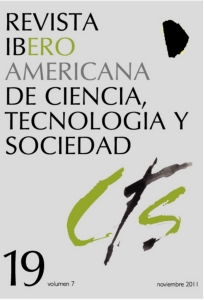Contributions to a naturalized conception of technology in John Dewey’s pragmatism
DOI:
https://doi.org/10.52712/issn.1850-0013-739Keywords:
organism, habit, technique, technologyAbstract
Although technical and biological evolution can be conceived as two independent phenomena, this is not the case with John Dewey’s philosophy. His theory of knowledge offers a naturalized subject who knows the world as long as he experiences it thorough controlled actions on her environment. These actions are the product of reflection and research, and they may become habits -in a naturalistic sense. Dewey’s notion of habit can be assimilated to his notion of technique, as presented in other passages of his work. Hence, the techniques -like any other habits of any organism- are modified with time in order to satisfy new imbalances from the environment. This change is the core of what Dewey called “technology”. In this article, we will try to show how this link between technical and organic evolution can become a contribution to develop a naturalized conception of technology.
Downloads
References
BERNSTEIN, R. (2010): Filosofía y democracia: John Dewey, Barcelona, Herder.
DEWEY, J. (1948): La experiencia y la naturaleza, México D.F., Fondo de Cultura económica.
DEWEY, J. (1950): Lógica: teoría de la investigación, México, D.F., Fondo de Cultura económica.
DEWEY, J. (1964): Naturaleza humana y conducta, México, D.F., Fondo de cultura económica.
DEWEY, J. (2000a): “El carácter práctico de la realidad”, en Á. M. Faerna: La Miseria de la Epistemología, Madrid, Biblioteca Nueva (pp. 157-174).
DEWEY, J. (2000b): “El concepto de Arco reflejo en Filosofía”, en Á. M. Faerna: La miseria de la epistemología, Madrid, Biblioteca Nueva (pp. 99-112).
DEWEY, J. (2000c): “El patrón de investigación”, en M. Á. Faerna: La miseria de la epistemología, Madrid, Biblioteca Nueva (pp. 113-132).
DEWEY, J. (2000d): “La evolución del pragmatismo norteamericano”, en M. Á. Faerna: La miseria de la epistemología, Madrid, Biblioteca Nueva (pp. 61-80).
DEWEY, J. (2000e): “La influencia del darwinismo en la filosofía”, en M. Á. Faerna: La miseria de la epistemología, Madrid, Biblioteca Nueva (pp. 49-60).
DURBIN, P. (2003): “Philosophical Tools for Technological Culture: Comments from an Activist Perspective”, Techné, pp. 36-41.
EAMES, S. M. (1977): Pragmatic Naturalism. An Introduction, Carbondale, Southern Illinois University Press.
EAMES, S. M. (2003): Experience and Value. Essays on John Dewey and Pragmatic Naturalism, Carbondale y Edwardsville, Southern Illinois University Press.
FAERNA, Á. M. (1996): Introducción a la teoría pragmatista del conocimiento, Madrid, Siglo Veintiuno.
FEENBERG, A. (2003): “Pragmatism and Critical Theory of Technology”, Techné, pp. 42-48.
HICKMAN, L. A. (1990): John Dewey’s Pragmatic Technology, Illinois, Indiana University Press.
HICKMAN, L. A. (2001): Philosophical tools for technological culture, Bloomington e Indianapolis, Indiana University Press.
QUINTANILLA, M. Á. (1948): “Técnica y Cultura”, Teorema, XVII, pp. 49-69.
MITCHAM, C. (1994): Thinking through Technology, Chicago, University of Chicago Press.
Downloads
Published
How to Cite
Issue
Section
License
Copyright (c) 2024 CC Attribution 4.0

This work is licensed under a Creative Commons Attribution 4.0 International License.
All CTS's issues and academic articles are under a CC-BY license.
Since 2007, CTS has provided open and free access to all its contents, including the complete archive of its quarterly edition and the different products presented in its electronic platform. This decision is based on the belief that offering free access to published materials helps to build a greater and better exchange of knowledge.
In turn, for the quarterly edition, CTS allows institutional and thematic repositories, as well as personal web pages, to self-archive articles in their post-print or editorial version, immediately after the publication of the final version of each issue and under the condition that a link to the original source will be incorporated into the self-archive.











